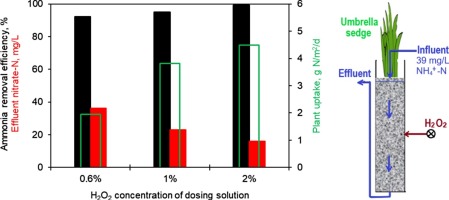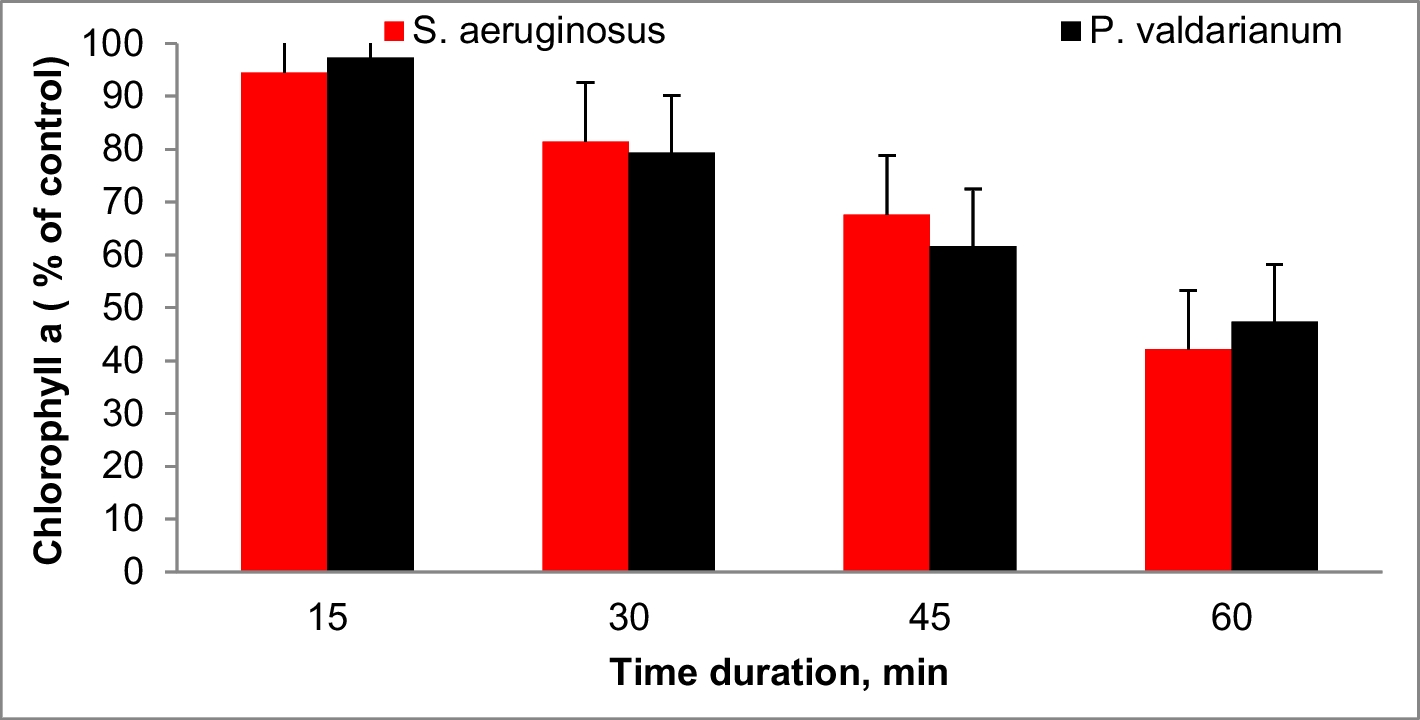So in my understanding H2O2, or H-O=O-H, is indeed a strong oxidizer just like O3.
What happens is it binds to organics, for example carbon chains, and splits them up:
C-C-C-C-C-C + H-O=O-H ==> C-C-C-O-H + H-O-C-C-C
Very easy representation, not exact ofcourse, and the peroxide can bind anywhere in the organic molecule.
Reactions could be very different depending on the molecule it reacts with, but this is the basis.
All life is made up of these organic molecules on a cellular level, think about cell walls, DNA, cell organels,...
If the cell wall is partially destroyed, the cell dies.
So if peroxide binds with enough organics, life is killed.
The result of this binding is a new organic molecule, an alcohol (typically carbon chain with OH at the end) in many cases, and it is in most cases not toxic.
So you could say once H2O2 binds, its effect is fully gone. In my opinion O3 does nearly thesame.
I like to compare it with burning wood with fire. It oxidises the organic matter, and the residue is mostly non-toxic.
Now the interesting part is that oxigen radicals are everywhere in nature. Like it is a byproduct of photosynthesis. Scientifically named, ROS (reactive oxigen species: O3, H2O2, O*,...) get formed easily and therefore many organisms have adapted to break it down.
Higher organisms are in many cases resistant as they have outer layers that protect them, and they have antioxidants (carotene, vitamin-C and many others) that break down the ROS. that means single cell organisms like dino's, algae, or bacteria are much more susceptible.
but not in every case. Like some strains of bacteria have katalase, an enzyme that breaks down H2O2. And will therefore be much more resilient than most.
I love to use H2O2 as a treatment against bacterial infections.
Sometimes my SPS start to STN, and i use a pipette to put some H2O2 on the dead area and the inch above. It works certainly in some cases.
Even better is brown jelly in euphyllia's, I have many large colonies with 20-150 heads, and had a brown jelly breakout.
You have to be quick, but once 1 head gets infected, cut out as much as you can, suck out most of the flesh and put H2O2 in with a pipette. It burns all leftover, and disinfects.
I have a 1000 gallon with large corals, so I cannot easily take out whole corals and dip them, so I like to do in tank spot treatments like this and they really help.
I did save a non-branching euphyllia even, A large colony, 1/3 was gone but I could stop the brown jelly spreading by sucking out the infected tissue and putting H2O2 in 3 times a day for 2 days. At the end not too many deaths from the brown jelly.
Whole tank treatments are different for me, you will kill a lot of the one celled organisms, but others like the catalase positive bacteria will stay alive. Result is you push your microbiological diversity a lot in the direction op catalase positives, and others that can break down H2O2. Is it bad? No idea! But microbiological diversity in your reef is a very important topic that we know too little about.
What happens is it binds to organics, for example carbon chains, and splits them up:
C-C-C-C-C-C + H-O=O-H ==> C-C-C-O-H + H-O-C-C-C
Very easy representation, not exact ofcourse, and the peroxide can bind anywhere in the organic molecule.
Reactions could be very different depending on the molecule it reacts with, but this is the basis.
All life is made up of these organic molecules on a cellular level, think about cell walls, DNA, cell organels,...
If the cell wall is partially destroyed, the cell dies.
So if peroxide binds with enough organics, life is killed.
The result of this binding is a new organic molecule, an alcohol (typically carbon chain with OH at the end) in many cases, and it is in most cases not toxic.
So you could say once H2O2 binds, its effect is fully gone. In my opinion O3 does nearly thesame.
I like to compare it with burning wood with fire. It oxidises the organic matter, and the residue is mostly non-toxic.
Now the interesting part is that oxigen radicals are everywhere in nature. Like it is a byproduct of photosynthesis. Scientifically named, ROS (reactive oxigen species: O3, H2O2, O*,...) get formed easily and therefore many organisms have adapted to break it down.
Higher organisms are in many cases resistant as they have outer layers that protect them, and they have antioxidants (carotene, vitamin-C and many others) that break down the ROS. that means single cell organisms like dino's, algae, or bacteria are much more susceptible.
but not in every case. Like some strains of bacteria have katalase, an enzyme that breaks down H2O2. And will therefore be much more resilient than most.
I love to use H2O2 as a treatment against bacterial infections.
Sometimes my SPS start to STN, and i use a pipette to put some H2O2 on the dead area and the inch above. It works certainly in some cases.
Even better is brown jelly in euphyllia's, I have many large colonies with 20-150 heads, and had a brown jelly breakout.
You have to be quick, but once 1 head gets infected, cut out as much as you can, suck out most of the flesh and put H2O2 in with a pipette. It burns all leftover, and disinfects.
I have a 1000 gallon with large corals, so I cannot easily take out whole corals and dip them, so I like to do in tank spot treatments like this and they really help.
I did save a non-branching euphyllia even, A large colony, 1/3 was gone but I could stop the brown jelly spreading by sucking out the infected tissue and putting H2O2 in 3 times a day for 2 days. At the end not too many deaths from the brown jelly.
Whole tank treatments are different for me, you will kill a lot of the one celled organisms, but others like the catalase positive bacteria will stay alive. Result is you push your microbiological diversity a lot in the direction op catalase positives, and others that can break down H2O2. Is it bad? No idea! But microbiological diversity in your reef is a very important topic that we know too little about.






















